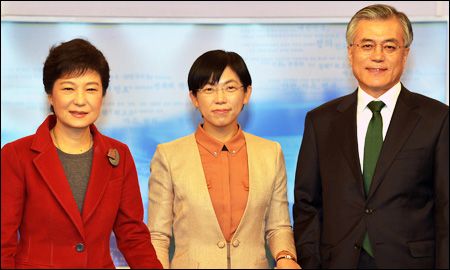
Park, Moon trade jabs on policy-oriented TV debate
There were no big surprises.
In their second TV debate Monday night, conservative presidential candidate Park Geun-hye and opposition contender Moon Jae-in traded jabs on chaebol, jobs, taxes and welfare, while minor leftist candidate Lee Jung-hee did her share of catfighting on the sidelines.
No knockout punches were thrown as the candidates brought their policies into sharp partisan line. With less than 10 days before the Dec. 19 election, Moon trails Park by margins on the borderline of error in the latest polls.
Moon, the Democratic United Party (DUP) nominee, widely seen to have lost the first encounter, came out swinging.
Park, the daughter of the late dictator Park Chung-hee and representing the Saenuri Party’s hopes to retain the country’s most powerful office, showed poise on the counter offensive, accusing her opponent of fanning anti-business sentiment and attempting to penalize the rich with tax hikes.
However, the minor leftist Unified Progressive Party (UPP) nominee Lee found herself interrupted numerous times by moderator Hwang Sang-moo, who strongly enforced the rules of debate. .
Moon looked sharper and more energetic than in the first debate, when he was heavily criticized for his listless performance, determined to maintain the bump in support he recently gained after former independent candidate Ahn Cheol-soo declared his support.
Moon identified Park with the incumbent Lee Myung-bak administration that he dubbed a failure. Park and Lee are from the Saenuri Party.
“Candidate Park admitted that the Lee Myung-bak administration failed in improving working-class living standards, but that was clearly not the only thing it failed at. It failed at democracy, economic growth, inter-Korean relations, national security and balanced regional growth. Inflation rose and household debt soared,’’ he said.
“This has much to do with candidate Park and the Saenuri Party agreeing to the lavish spending on the four river restoration project, cutting taxes for the rich and railroading laws disadvantaging working-class citizens and annual budget plans year after year.’’
Park responded that the seeds of inequality and decaying family finances were sewn by the government of Lee’s predecessor, the late Roh Moo-hyun, and claimed that Moon would repeat the mistakes of his political mentor.
“We can’t continue this debate without talking about the Roh government. Real estate prices jumped most dramatically then, inequality accelerated at the fastest pace and college tuitions rose most sharply during this time. The economy eventually turned bad and that’s why voters picked a different government,’’ she said.
“Candidate Moon’s economic policies don’t look meaningfully different that the plans pushed under the Roh government. The world economy was very active at that time, but our country failed to be even average.’’
Park and Moon had been sparring ferociously over how far the country should push the efforts to reform chaebol, the mighty family-owned conglomerates that have been frequently been accused of monopolistic behavior and illegal wealth transfers among their owners. The two extended their finger jabbing over the issue as well as on the ways to create more jobs and inspire entrepreneurship.
“To ease the pain from the economic downturn and regain pace in growth, the key would be achieving the democratization of the economy and thus creating more jobs,’’ Moon said.
“Large firms have been raking in 10 to 20 trillion won (about $18.5 billion) in profit every year, but small- and medium-sized firms, self-employed businesses, workers and working-class families have been screaming in agony. We need to find a way to spread the fruits of growth more broadly.’’
Park countered that any new restriction on chaebol should be kept within the boundaries of fair trade principles.
“Reforming large businesses is very important. (I will) correct the wrongs chaebol commit, such as when the majority shareholders pursue their personal interests excessively or when the companies show anti-competitive behavior and encroach on the markets traditionally occupied by small merchants,’’ she said.
Park also attacked Moon for his plans to raise taxes to strengthen healthcare services, including limiting the annual expenses on insurance to 1 million won annually per person and widening coverage for low-income earners. Moon countered that Park was presenting her own set of bulked-up healthcare schemes without providing specific plans for financing them.
There had been little differentiation between Park and Moon at the start of the year over the chaebol issue as they both adopted the “democratization of economy’’ slogan and speechified about preventing large corporations from killing parity in market competition.
But with worsening global conditions resulting in a sharp pullback in economic growth, Park has since backtracked from her previous promises and is now seen talking up the role of large companies in navigating the country out of the crisis.
Moon, in comparison, retained most of his plans on reforming chaebol, including stemming the practice of “circular’’ equity investment, which allow the companies to weave a complex web of corporate ownership that accelerates the transfer of wealth and management power within their founding families.
He also vowed to strengthen cross-ownership restrictions on industrial and financial companies, which would affect business groups such as Samsung, Hyundai Motor, Lotte and Hanwha. <The Korea Times/Kim Tong-hyung>




